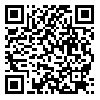

Volume 18, Issue 3 (11-2020)
RBS 2020, 18(3): 403-415 |
Back to browse issues page
Download citation:
BibTeX | RIS | EndNote | Medlars | ProCite | Reference Manager | RefWorks
Send citation to:



BibTeX | RIS | EndNote | Medlars | ProCite | Reference Manager | RefWorks
Send citation to:
Shahbazfar R, Zarei E, Hajializadeh K, Dortaj F. Comparison of Effectiveness of Cognitive-Behavioral Couple Therapy and Acceptance Commitment Therapy Approaches in Affective-sexual Needs. RBS 2020; 18 (3) :403-415
URL: http://rbs.mui.ac.ir/article-1-837-en.html
URL: http://rbs.mui.ac.ir/article-1-837-en.html
1- Ph.D. Student in General Psychology, Department of psychology, Bandar Abbas Branch, Islamic Azad University, Bandar Abbas. Iran.
2- Associate Professor, Department of Counseling and Psychology, University of Hormozgan, Bandar Abbas, Iran. , eghbalzarei2010@yahoo.com
3- Associated Professor, Department of psychology, Bandar Abbas Branch, Islamic Azad University, Bandar Abbas, Iran.
4- Professor, Department of Educational Psychology, Allameh Tabataba'i University, Tehran, Iran.
2- Associate Professor, Department of Counseling and Psychology, University of Hormozgan, Bandar Abbas, Iran. , eghbalzarei2010@yahoo.com
3- Associated Professor, Department of psychology, Bandar Abbas Branch, Islamic Azad University, Bandar Abbas, Iran.
4- Professor, Department of Educational Psychology, Allameh Tabataba'i University, Tehran, Iran.
Abstract: (2669 Views)
Aim and Background: Affective-sexual needs are as important motivational forces that have a vital role in the stability and enhancing of quality of marital life. Then the main goal of the current research was the comparison of the effectiveness of cognitive-behavioral couple therapy (CBCT) and acceptance commitment therapy (ACT) approaches on enhancing affective-sexual needs among Nonclinical Couples in Bandar Abbas city, Iran.
Methods and Materials: The research design was semi-experimental design with pretest, posttest, and follow up. The statistical population of this study includes of nonclinical couples that participated in the training course about life skills and cyberspace. 48 subjects were selected through a convenient sampling method and randomly assigned to two groups of interventions, CBCT and ACT, and one control group. Each couple in intervention groups received 12 sessions and 90 minutes of therapy. Affective-Sexual Needs of Iranian Couples scale (2020) used for gathering data and analysis of variance with repeated measures tests used for analyzing data by using SPSS 19 software.
Findings: The result showed that both CBCT and ACT interventions were effective to enhance affective-sexual couple's needs. Moreover, comparing the effectiveness of CBCT and ACT approaches showed that the ACT approach was more effective in enhancing of three dimensions of affective-sexual couple's needs include avoiding discouraging behaviors, affection-sexual needs, physical-sexual needs.
Conclusions: It seems the implementation of CBCT and ACT interventions are useful for enhancing affective-sexual couple's needs. This could influence other dimensions of marital life such as marital satisfaction and marital quality.
Methods and Materials: The research design was semi-experimental design with pretest, posttest, and follow up. The statistical population of this study includes of nonclinical couples that participated in the training course about life skills and cyberspace. 48 subjects were selected through a convenient sampling method and randomly assigned to two groups of interventions, CBCT and ACT, and one control group. Each couple in intervention groups received 12 sessions and 90 minutes of therapy. Affective-Sexual Needs of Iranian Couples scale (2020) used for gathering data and analysis of variance with repeated measures tests used for analyzing data by using SPSS 19 software.
Findings: The result showed that both CBCT and ACT interventions were effective to enhance affective-sexual couple's needs. Moreover, comparing the effectiveness of CBCT and ACT approaches showed that the ACT approach was more effective in enhancing of three dimensions of affective-sexual couple's needs include avoiding discouraging behaviors, affection-sexual needs, physical-sexual needs.
Conclusions: It seems the implementation of CBCT and ACT interventions are useful for enhancing affective-sexual couple's needs. This could influence other dimensions of marital life such as marital satisfaction and marital quality.
Keywords: Affective-sexual needs, cognitive-behavioral couple therapy, acceptance and commitment therapy.
Type of Study: Research |
Subject:
Special
Received: 2020/09/28 | Accepted: 2020/10/31 | Published: 2020/11/28
Received: 2020/09/28 | Accepted: 2020/10/31 | Published: 2020/11/28
Send email to the article author
| Rights and permissions | |
 |
This work is licensed under a Creative Commons Attribution-NonCommercial 4.0 International License. |





